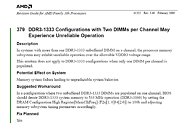Thursday, February 12th 2009

Phenom II AM3 Plagued with DDR3-1333 Issue
Barely a week into the introduction of the DDR3-supportive AM3 socket CPUs, the processors seem to be having design flaws. This, as circulated by AMD in its revision guide document for the 10h family of processors (found here, page 80). The issue, as described by AMD, centers around the DDR3 memory sub-system. On machines with more than one PC3-10600 (1333 MHz) memory module populating a memory channel, the users may experience unreliable operation. The company does not get into the specifics of the symptoms. This issue however, does not affect systems with a module per channel (one or two modules installed in the motherboard), and only those with three to four modules installed.
The AMD K10 memory controllers on AM3-socket processor provide a 128-bit wide memory interface (with DRAM Ganged mode enabled), which amount to two 64-bit wide memory channels. On most motherboards, four DIMM slots with two slots sharing a memory channel are present. With this issue, one is not recommended to use more than one DDR3-1333 memory module per channel. AMD recommends a quick fix for the issue for systems using more than one DDR3-1333 module per memory channel: to manually specify the memory to run at 533 MHz (1066 MHz DDR), and accordingly set DRAM timings. As a little compensation, one can tighten DRAM timings with the drop in frequency. AMD will fix this issue in the next stepping (sub-version) of the CPUs. The "x-factor" with this erratum revolves around DRAM voltage, a significant factor. One might note AMD saying "the processor memory subsystem may exhibit unreliable operation over the allowable VDDIO voltage range", which leads us to think if there is a potential workaround with adjusting the DRAM voltage beyond the allowable range (read: over-volting the memory). We hope to hear more from AMD on this.
UPDATE (02/13): AMD replied to the report, saying that work is in progress toward fixing the issue. While not getting into the specifics, AMD indicated to us that apart from addressing the issue, the company is also working toward something "which will make you 'feel cozy' about the DDR3 support". The statement is ambiguous, and is best left uninterpreted at this point in time.
The AMD K10 memory controllers on AM3-socket processor provide a 128-bit wide memory interface (with DRAM Ganged mode enabled), which amount to two 64-bit wide memory channels. On most motherboards, four DIMM slots with two slots sharing a memory channel are present. With this issue, one is not recommended to use more than one DDR3-1333 memory module per channel. AMD recommends a quick fix for the issue for systems using more than one DDR3-1333 module per memory channel: to manually specify the memory to run at 533 MHz (1066 MHz DDR), and accordingly set DRAM timings. As a little compensation, one can tighten DRAM timings with the drop in frequency. AMD will fix this issue in the next stepping (sub-version) of the CPUs. The "x-factor" with this erratum revolves around DRAM voltage, a significant factor. One might note AMD saying "the processor memory subsystem may exhibit unreliable operation over the allowable VDDIO voltage range", which leads us to think if there is a potential workaround with adjusting the DRAM voltage beyond the allowable range (read: over-volting the memory). We hope to hear more from AMD on this.
UPDATE (02/13): AMD replied to the report, saying that work is in progress toward fixing the issue. While not getting into the specifics, AMD indicated to us that apart from addressing the issue, the company is also working toward something "which will make you 'feel cozy' about the DDR3 support". The statement is ambiguous, and is best left uninterpreted at this point in time.

105 Comments on Phenom II AM3 Plagued with DDR3-1333 Issue
As a matter of fact I believe that one or more of the reviews put out stated that if you wanted to use more than one dimm per channel then you would have to decrease the speed to 1066Mhz so I'm not surprised in the least bit.
I'll see if I can find the reviews that state that. :) See reviews at bottom of post!
Kei
Edit: Here are 2 I found real quick, I'd be willing to bet that many more stated the same fact. Always read before you buy...then again majority of the people complaining wouldn't be reading or buying anyway. :roll:
www.hexus.net/content/item.php?item=17113&page=2
www.anandtech.com/cpuchipsets/showdoc.aspx?i=3512&p=3
Although, really, at this point there isn't much point to ddr3 anyway. Aside from lower voltages and higher mem benches there seems to be no compelling advantage to ddr3 over ddr2. We seemed to have reached a point (like processor speed) where in most applications more memory speed simply isn't needed, and yields very little gains. Might as well stick w/ ddr2 for now.
There is definitely a problem, but to what extent might vary user to user. e.g. I might put in OCZ DDR3 1600 and be 100% stable on MSI board, however you might put in Kingston DDR3 1600 in a Asus board and get incompatibilities and hence forcing you to reduce the bus to 1066 MHz and tighten the timings to compensate :)Intel has a huge budget so there errata issues probably get fixed before the press find out, also Intel's budget allows for them to enhance their advantages through propaganda to cover up the bad media regarding their errata issues.
Edit:I would presume that if the issue effected your system it would be a matter of going into the bios and turning off "Auto" in the settings and selecting "manual" and reducing the memory bus. Typically, when you reduce the memory bus the latency timings also tighten in concert.
As for a fix, it might be that AMD say "forget a fix" only 5% of users are having issues why invest money.
There will be a definite fix on the next revision of CPU stepping which would indeed mean that a new CPU would have to be purchased (presuming you are one of the effected few). Perhaps motherboard manufacturers are able to fix it via a bios update which I doubt.
If I were to buy one I'd use 2x2GB DDR2, so no problem at all, but I wouldn't say that buying one.
Anyone who buys the "latest" revision or release is prone to hit problems. I never EVER buy a first revision of anything. Electronics or cars. Let someone else iron out the bugs......except women. I like first revisions of women ;)
Edit: Can me and Binge still riot in the name of AMD?
Here in the UK DDR3 is stupidly priced. DDR3 @ 1333MHz will not be a big enough performance boost to justify it over my current stick. Unless I can get DDR3 1800MHz or better I can't see myself buying DDR3 unless their is a drastic price reduction.
At present I can buy 16 GB of premium DDR2 PC6400 or DDR2 PC8500 for the price of 4 GB of basic DDR3 :shadedshu
I wish their techies were listening to this thread.
Also on the current note, AMD may delay the launch of these CPUs or send these with OEM machines and then launch a stepping revision that has the permanent fix.
And it does seem to be effecting the response... compare the first set of replies to this article vs. the replies on VR-zone.
I don't see how this is a surprise to anyone at all that actually read the review of the cpus before they bought one.
To me the title of the thread does suck, but hey it's the news that's what news reporters do so he's just doing his job. Don't get caught up on the wording when you already know better anyway. Read fine print and let our awesome news man do his job. :p
Kei
For most users, they read about mobos when they want to know the memory supports, not the CPU itself, because:
You put the CPU on the mobo which supported that cpu, and you put the memory on the mobo, which supported that memory.
You don't put a memory on a mobo, because the CPU supports it.
It's obvious isn't it...?
if you got two ddr3 ram sticks you still got 1333 speed ;)
who buys 4 sticks of ddr3?
its freaking expensive even two sticks
bit-tech quote!www.bit-tech.net/hardware/cpus/2009/02/11/amd-phenom-820-810-720-710-am3-cpus/1
Spotify » Mandy Moore - One Way or Another
AMD needs to do what Intel did with the Pentium 4/Core 2: accept that their current architecture (K10) is fundamentally flawed, throw it in the bin, then build a new architecture based on one that's proven and reliable (K8). If they don't (won't) do this, they are, quite simply, doomed.
I only hope that ATI comes out of this intact.